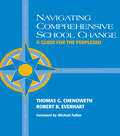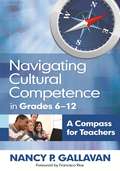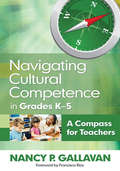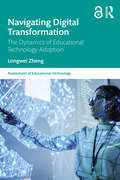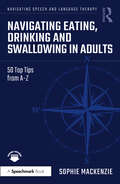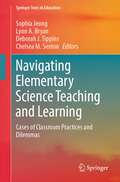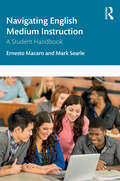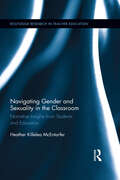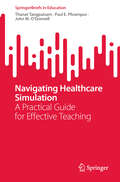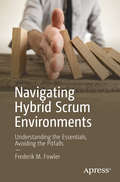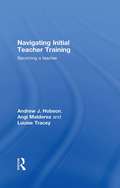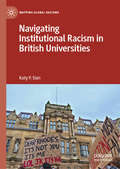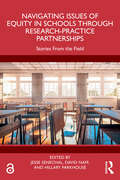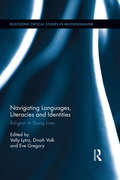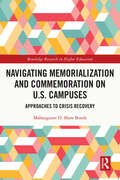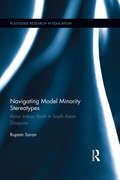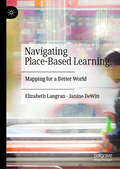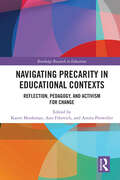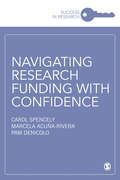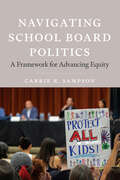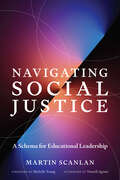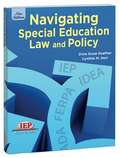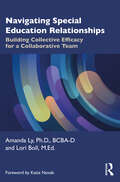- Table View
- List View
Navigating Comprehensive School Change
by Robert Everhart Thomas ChenowethThis book, an accessible resource for busy practitioners, is a unique hybrid of two genres. As a "tourist guide," it shows you how to prepare for the journey, what to pay attention to upon arrival, and how to deal with the unexpected. As a "consumer report", it helps you identify some of the best tools and sources about change, access useful information about the change process, and find information about the strengths and challenges of various strategies. Thorough and comprehensive, it offers essential information about how to form leadership teams, identify high stakes problems, build commitment, create a school-wide vision and establish school-wide goals, handle setbacks, maintain the vision and sustain change, and evaluate and assess comprehensive school change. Also included is a section called "Ports of Call," which provides sources of information to help you implement comprehensive school reform at your site.
Navigating Conflict: How Youth Handle Trouble in a High-Poverty School (Chicago Series in Law and Society)
by Michael Musheno Calvin MorrillUrban schools are often associated with violence, chaos, and youth aggression. But is this reputation really the whole picture? In Navigating Conflict, Calvin Morrill and Michael Musheno challenge the violence-centered conventional wisdom of urban youth studies, revealing instead the social ingenuity with which teens informally and peacefully navigate strife-ridden peer trouble. Taking as their focus a multi-ethnic, high-poverty school in the American southwest, the authors complicate our vision of urban youth, along the way revealing the resilience of students in the face of carceral disciplinary tactics. Grounded in sixteen years of ethnographic fieldwork, Navigating Conflict draws on archival and institutional evidence to locate urban schools in more than a century of local, state, and national change. Morrill and Musheno make the case for schools that work, where negative externalities are buffered and policies are adapted to ever-evolving student populations. They argue that these kinds of schools require meaningful, inclusive student organizations for sustaining social trust and collective peer dignity alongside responsive administrative leadership. Further, students must be given the freedom to associate and move among their peers, all while in the vicinity of watchful, but not intrusive adults. Morrill and Musheno make a compelling case for these foundational conditions, arguing that only through them can schools enable a rich climate for learning, achievement, and social advancement.
Navigating Cultural Competence in Grades 6–12: A Compass for Teachers
by Nancy P. GallavanChart your course with the Gallavan cultural competence compass All children have one important thing in common—the need to be treated with dignity, respect, and care. This handbook shows teachers and administrators how to ensure that the cultures of all peoples are considered and valued. The author’s eight-point cultural compass guides you in crafting a respectful and inclusive curriculum. Each chapter includes frequently asked questions, specific strategies, and activities for: Broadening your knowledge about cultural diversity Increasing your confidence in teaching about culture Creating a welcoming learning environment
Navigating Cultural Competence in Grades K–5: A Compass for Teachers
by Nancy P. GallavanCreate a welcoming environment for young children with the cultural competence compass Young children making the transition from home to school need gentle guidance and warm, student-centered surroundings. This helpful resource helps you ensure that all students are treated with dignity and respect, and that their cultures are valued. The author provides an eight-point cultural compass for crafting a grade-appropriate inclusive curriculum. Each chapter includes frequently asked questions, specific strategies, and activities that help you: Ask the right questions for determining culturally-appropriate curriculum Engage children in cultural discussions that build confidence Include cultural sensitivity across all content areas
Navigating Digital Transformation: The Dynamics of Educational Technology Adoption (Assessment of Educational Technology)
by Longwei ZhengThis book explores the process of educators’ technology adoption, which is crucial for digital transformation in today's educational landscape. It is based on rigorous research which highlights the dynamics of technology adoption, the evolution of institutional culture, and the development of digital artifacts as educators navigate the incorporation of educational technology. Through a thorough analysis of the complex factors influencing technology adoption, the book seeks to bridge theory and practice, technology and teaching methods, policy, and execution, to promote more effective and meaningful educational innovation and transformation.This book confronts the challenges within this field by illustrating the development process of teachers' technology adoption. It introduces novel representations and analytics of technology adoption dynamics, offering new insights into the mechanisms behind teachers' technological understanding beyond mere self-reported acceptance. Through a thorough analysis of the complex factors influencing technology adoption, the book seeks to bridge theory and practice, technology and teaching methods, policy, and execution, to promote more effective and meaningful educational innovation and transformation. To study the short- and long-term effects that may improve the assessment of interventions, the author proposes a dynamic model. The reader is also introduced to a framework based on a downscaling scheme that can project cultural factors of the institution onto a teacher’s implementation behaviour. The book further considers navigating through technological integration by inspecting technology-related quality of teaching artifacts. It considers patterns of integrating digital tools and teaching practice that can be identified by examining the technology-specific quality of digital artifacts shaped by teachers.This book targets several key groups in the education sector, including educators, researchers, policymakers, and educational technology professionals. The author shares the knowledge to support the integration of technology and transformation in education by providing interdisciplinary perspectives and practical strategies.
Navigating Eating, Drinking and Swallowing in Adults: 50 Top Tips from A-Z (Navigating Speech and Language Therapy)
by Sophie MacKenzieThis book offers accessible and concise information to enable both student and qualified clinicians to navigate essential eating, drinking and swallowing (EDS) knowledge and equip them to meet relevant clinical competencies.Arranged alphabetically, the book provides an A to Z of EDS assessment and management in adults, guiding readers through key aspects, from aetiologies to xerostomia and from cranial nerve assessments to videofluoroscopy. This dip in, dip out resource is packed with information of immediate clinical relevance, facilitating synthesis between theory and practice, and encourages readers to view their clients in a holistic, person-centred way. It contains printable resources and concludes with a useful appendix providing worked examples of clinical scenarios.Divided into 50 tips to enhance practice, this pocket-sized guide is an essential resource for all trainee and newly qualified speech and language therapists, as well as more experienced clinicians moving into the field.
Navigating Elementary Science Teaching and Learning: Cases of Classroom Practices and Dilemmas (Springer Texts in Education)
by Deborah J. Tippins Sophia Jeong Lynn A. Bryan Chelsea M. SextonThis book is a resource for both prospective and practicing elementary teachers as they learn to teach science in ways which foster the development of a community of science learners with multiple perspectives and diverse approaches to problem solving. It includes cases that feature dilemmas embedded in rich narrative stories which characterize the lives of teachers of science, and by extension their students, and serve as tools for discussion, critique, and reflective practice. The introduction to the book explores changing contexts for elementary science teaching and learning, and describes how case-based pedagogy can be used as a tool for both instruction and research. Each subsequent section of the book includes cases that are organized around topics such as contemporary approaches to teaching elementary science, new roles for technology, and the creation of inclusive learning environments for all students in elementary science. Each case is followed by reflective commentaries and concludes with questions for reflection and discussion. Teachers will benefit from these cases as they explore the complexities and ambiguities of elementary science teaching and learning in today’s classrooms.
Navigating English Medium Instruction: A Student Handbook
by Ernesto Macaro Mark SearleThis skills-oriented handbook for English Medium Instruction (EMI) learners provides students with a toolbox of strategies and approaches to maximise their performance in their courses.EMI learners are students who are studying an academic subject, other than English itself, through the medium of English. Through a series of carefully designed exercises and awareness-raising tasks showcased in this book, students can develop the skills and strategies they need to optimise their academic performance in the face of considerable academic and language challenges. This accessible text is full of strategies for students to use the English language they already have in order to engage more fully in their academic courses. They will become much more efficient at preparing for, performing in, and reflecting on their classes. The book covers preparing for classes (pre-flight activities); performing in classes (in-flight strategies); and reflecting on classes (after landing).Grounded in the research of EMI teaching and learning and in extensive teacher-training within EMI, this is a valuable resource for any EMI student studying in a university across the world, as well as EMI teachers, EAP/ESP educators, and academic support staff who work with EMI learners.
Navigating Gender and Sexuality in the Classroom: Narrative Insights from Students and Educators (Routledge Research in Teacher Education)
by Heather Killelea McEntarferGender identity and sexuality play crucial roles in the educational experiences of students, parents, and teachers. Teacher education must more directly address the ways that schools reflect and reproduce oppressive gender norms, working to combat homophobia, transphobia, heteronormativity, and gendered expectations in schools. This volume examines teacher candidates’ experiences with gender and sexuality in the classroom, offering insight and strategies to better prepare teachers and teacher educators to support LGBTQ youth and families. This volume addresses the need for broader, more in-depth qualitative data describing teacher candidates’ responses to diversity in the classroom (including gender, sexuality, race, class and religion). By using pedagogical tools such as narrative writing and positioning theory, teacher candidates explore these issues to better understand their own students’ narratives in deeply embodied ways. This book calls for schools to be places where oppression, in all its complexity, is explored and challenged rather than replicated.
Navigating Healthcare Simulation: A Practical Guide for Effective Teaching (SpringerBriefs in Education)
by John M. O'Donnell Thanat Tangpaisarn Paul E. PhrampusThis book is crafted for both novice simulation educators embarking on their teaching careers and seasoned subject matter experts seeking to enhance the effectiveness of their simulation programs. The book draws on the effort of a novice simulation educator under the guidance of two simulation experts with over 40 years of collective experience. Readers will embark on a transformative journey with this book, which is designed to empower readers who utilize simulation as a teaching tool. This book serves as a roadmap, leading educators toward a more organized and practical approach to conducting simulations. Covering a wide spectrum of topics, the book begins with insights into associated learning theories for simulation, providing valuable strategies for increasing learner engagement. Delving deeper, it explores various simulation modalities and locations, guiding educators to choose the best options for their teaching objectives. Within the pages of this handbook, readers will find detailed discussions on scenario design, simulation phases and crucial aspect of simulation best practices including prebriefing, implementation, facilitation and debriefing among others. In addition, the book addresses learner assessment and course evaluation, ensuring a well-rounded understanding of the entire simulation process. The authors invite readers to explore the wealth of knowledge within these pages, with the hope that they will gain valuable insights to elevate their simulation knowledge and skills and contribute to the continuous improvement of their teaching practices to the benefits of their students.
Navigating Hybrid Scrum Environments: Understanding The Essentials, Avoiding The Pitfalls
by Frederik M. FowlerKnow the details of each part of Scrum so you can understand the purpose each part serves in the framework. Many books describe the “what” part of Scrum, but few explain the “why." Every part of the Scrum framework is important. You need to know the purpose behind each of the parts of the Scrum framework to reap all of its benefits.This book uses stories and examples to provide the understanding of Scrum that is necessary to avoid failure in an Agile transformation effort, and fills an important gap in the existing body of literature about the Scrum framework. Advanced topics also are covered: scaled Scrum, Scrum for projects, and Scrum for the program and portfolio level.What You'll LearnUse the Scrum framework more effectively, especially if you are working in a “hybrid” Scrum environmentUnderstand what to expect from the Scrum framework, how to support it in your organization, and how to measure and maximize resultsStudy Scrum and pass Scrum Master certification tests given by Scrum.orgWho This Book Is ForManagement professionals, existing Scrum masters, product owners, and Scrum developers, and beginners looking to learn Scrum
Navigating Initial Teacher Training: Becoming a Teacher
by Andrew J Hobson Angi Malderez Louise TraceyAre you considering or already training to become a teacher? Do you want to know more about the variety of types of training on offer? Do you need reassurance that you are on the right path? Or would you just like to see how others cope with their teacher training? If so, this lively book, built on the experience of thousands of people just like you, is exactly what you need. Written by experts with backgrounds in teaching, supporting teacher learning and researching teacher training, and based on a major study of nearly 5,000 beginner teachers, it provides an authentic insight into what lies ahead when becoming a teacher. The book, which incorporates extensive conversations with large numbers of student and newly qualified teachers, will also serve as the ideal course companion when undertaking your Initial Teacher Training programme. It includes practical ideas and strategies for coping with various aspects of life as a student teacher, for example, dealing with pupil behaviour, building and managing relationships with mentors and other teachers in schools, and finding and obtaining a first teaching post.
Navigating Institutional Racism in British Universities (Mapping Global Racisms)
by Katy P. SianThis book critically examines the experiences of racism encountered by academics of colour working within British universities. Situated within a critical race theory and postcolonial feminist framework, Sian thoughtfully centres the voices of the interviewed academics, and draws upon her own experiences and reflections through a critical auto-ethnography. Navigating Institutional Racism in British Universities unpacks a range of complex and challenging questions, and engages with the way in which racial politics in the academy interplay and intersect with gender. The book presents a textured narrative around the various barriers facing academics of colour, and enhances understandings of experiences around institutional racism in British universities. Alongside its conceptual and empirical contribution, it develops a series of practical recommendations to encourage and facilitate the active participation of academics of colour in British universities.
Navigating Issues of Equity in Schools Through Research-Practice Partnerships: Stories From the Field
by Jesse Senechal David Naff Hillary ParkhouseThis book provides a wealth of rich cases describing how research-practice partnerships (RPPs) in K-12 schools navigate equity in the design and implementation of their projects and shares insightful recommendations for both research-side and practice-side RPP leaders engaged in this work. Chapter authors from both researcher and practitioner communities unpack real examples that illustrate how RPPs conceptualized, conducted, and shared research related to prominent equity challenges in K-12 schools. Chapters also detail specific tensions and challenges – political, methodological, relational – and how to overcome these. Presenting an equity-focused RPP framework, this important volume explores how to cultivate trusting and equitable relationships among partners, prioritize humanity and equity in the identification and articulation of a RPP project topic, center equity goals, and align methodological approaches to equity objectives. This important resource helps aspiring, new, and veteran RRP leaders initiate projects or partner with new collaborators as they develop trusting relationships within university and school settings in order to conduct impactful, equity-oriented research.
Navigating Languages, Literacies and Identities: Religion in Young Lives (Routledge Critical Studies in Multilingualism)
by Eve Gregory Vally Lytra Dinah VolkNavigating Languages, Literacies and Identities showcases innovative research at the interface of religion and multilingualism, offering an analytical focus on religion in children and adolescents’ everyday lives and experiences. The volume examines the connections between language and literacy practices and social identities associated with religion in a variety of sites of learning and socialization, namely homes, religious education classes, places of worship, and faith-related schools and secular schools. Contributors engage with a diverse set of complex multiethnic and religious communities, and investigate the rich multilingual, multiliterate and multi-scriptal practices associated with religion which children and adolescents engage in with a range of mediators, including siblings, peers, parents, grandparents, religious leaders, and other members of the religious community. The volume is organized into three sections according to context and participants: (1) religious practices at home and across generations, (2) religious education classes and places of worship and (3) bridging home, school and community. The edited book will be a valuable resource for researchers in applied linguistics, linguistic anthropology, socio-linguistics, intercultural communication, and early years, primary and secondary education.
Navigating Memorialization and Commemoration on U.S. Campuses: Approaches to Crisis Recovery (Routledge Research in Higher Education)
by Mahauganee D. Shaw BondsDrawing on rich qualitative data, as well as theoretical and conceptual frameworks, this text explores how institutions of higher education in the US can effectively remember incidents of campus crisis through physical memorials and commemoration. Recognizing memorialization as a process of group and individual recovery, the book foregrounds the performative functions of physical memorials, and highlights their utility for the extended campus community. Profiling existing campus memorials in the US, and offering insights from students, faculty, community members, and the loved ones of those memorialized, the text illustrates how institutional decisions and long-term strategy can serve to effectively navigate the politics of memorialization, helping communities move beyond incidents of collective trauma. This text will benefit researchers, academics, and educators with an interest in emergency management, student affairs practice and higher education administration, and commemorative literature more broadly. Those specifically interested in heritage studies, public history, and American history will also benefit from this book.
Navigating Model Minority Stereotypes: Asian Indian Youth in South Asian Diaspora (Routledge Research in Education #146)
by Rupam SaranThough Asian Indians are typically thought of as a "model minority", not much is known about the school experiences of their children. Positive stereotyping of these immigrants and their children often masks educational needs and issues, creates class divides within the Indian-American community, and triggers stress for many Asian Indian students. This volume examines second generation (America-born) and 1.5 generation (foreign-born) Asian Indians as they try to balance peer culture, home life and academics. It explores how, through the acculturation process, these children either take advantage of this positive stereotype or refute their stereotyped ethnic image and move to downward mobility. Focusing on migrant experiences of the Indian diasporas in the United States, this volume brings attention to highly motivated Asian Indian students who are overlooked because of their cultural dispositions and outlooks on schooling, and those students who are more likely to underachieve. It highlights the assimilation of Asian Indian students in mainstream society and their understandings of Americanization, social inequality, diversity and multiculturalism.
Navigating Place-Based Learning: Mapping for a Better World
by Elizabeth Langran Janine DeWittThis book explores how educators can realize the potential of critical place-based pedagogy. The authors’ model leverages the power of technology through strategies such as mobile mapping so that students can read the world and share spatial narratives. The same complexity that makes spaces outside the classroom ideal for authentic, purposeful learning creates challenges for educators who must minimize students taking wrong turns or reaching dead ends. Instructional design process is key and the authors offer exemplars of this from multiple disciplines. Whether students are exploring a local community or a natural environment, place-based inquires must include recognition of privilege and the social dynamics that reinforce inequalities. Concluding with a discussion of the changing social context, the authors highlight how contemporary events add a sense of urgency to the call for a critical place-based pedagogy—one that is more inclusive for all students.
Navigating Precarity in Educational Contexts: Reflection, Pedagogy, and Activism for Change (Routledge Research in Education)
by Karen Monkman Ann Frkovich Amira ProwellerThis volume offers a timely collection of research-based studies that engage with contemporary conditions of precarity across an array of locations, exploring how it is understood, experienced, and acted upon by educators in schools, universities, and nonformal educational spaces. Precarity presents as layered, unpredictable, destabilizing, and rapidly shifting socio-political and economic dynamics, shown here in various forms, including the global pandemic, divisive populist politics, displacement of refugees and the landless, race and gender injustices, and neoliberal policies that constrain educational and social possibilities. Grouped around reflection, educational practice, and social activism, the authors show how educators engage these precarious conditions as they work toward a more interconnected, humane, and just society. This text will benefit researchers, academics, and educators with an interest in social foundations of education, multicultural and social justice education, educational policy, and international and comparative education, sociology and anthropology of education, and cultural studies within education, among other fields.
Navigating Research Funding with Confidence (Success in Research)
by Pam Denicolo Carol Spencely Marcela Acuna-RiveraA timely manual in the current climate of increasingly underfunded departments and institutions, this book offers insight into how to secure, manage and effectively research funding in the changing order of global economy and competing research priorities. It gives you the perspectives of those who seek, and those who award research funding, such as governments, companies and foundations. Examining the full cycle and elements of influence of research funding, this book comes with: • Practical case studies, • Lists of potential funding sources that you can use to enhance your funding generation efforts, and • Explanatory videos Clear and digestible, this text delivers systematic guidance for early career researchers and students in Graduate Schools, Doctoral Colleges, Research Methods Programmes, Academic and Research Staff Development Programmes.
Navigating Ruptures, Repairs, and Termination Within the Therapeutic Process
by Judy Z. KoenigsbergThis book explores the importance of the therapeutic relationship, the tensions or disagreements that may emerge during a therapy session, and how they can be repaired.Dr. Koenigsberg introduces a two-part transtheoretical, psycholinguistic model which focuses on the connection between ruptures and the termination phase of therapy, emphasizing the verbal and nonverbal nuances of language, to understand what is happening in the therapeutic alliance. With a reliance on psycholinguistic elements, this model can guide therapists who wish to reduce the premature termination of patients from therapy. Written in an accessible format, it provides case examples, including the patient’s and therapist’s inner experiences, and defines and describes the phases of therapy so that difficult transitions in the therapeutic process can be navigated with skill and compassion.This text is essential for providing early career as well as more seasoned therapists with excellent strategies to repair their therapeutic relationships with clients.
Navigating School Board Politics: A Framework for Advancing Equity (Race and Education)
by Carrie SampsonA visionary overview of the political role of publicly elected school boards and a proactive take on the work they can accomplish toward social justice
Navigating Social Justice: A Schema for Educational Leadership
by Martin ScanlanA highly accessible and easily adaptable conceptual framework that helps educational leaders plan, leverage, and sustain change as they create more equitable schools. In Navigating Social Justice, Martin Scanlan introduces a comprehensive social justice schema that melds organizational learning with leading for equity. Scanlan distills wisdom gleaned from the experiences of a variety of educational professionals as well as from his own more than three decades of work in equity-focused partnership with elementary schools. Scanlan&’s schema brings together five dimensions—inclusivity, communities of practice, critical formation, social ecosystems, and practical wisdom—that work together holistically to eradicate inequitable practices and policies and promote robust teaching and inclusive learning. For each dimension, the book features real-life vignettes that focus the conversation, exercises that encourage reflection, and suggested opportunities for the application of its central ideas. Each chapter also gives access to online tools, extending its utility. The practical guidance offered in this book not only will enable educational institutions to best meet the needs of families and community members but will also help leaders cultivate the moral and intellectual judgment needed to address social justice issues in schools. This clarifying equity framework will be invaluable to established and aspiring school leaders, building administrators, district leaders, system administrators, and others in both the public and private education sectors as they engage in ongoing social justice work.
Navigating Special Ed Law And Policy
by Attainment CompanyA comprehensive guide to special education rights and responsibilities.The right of students with disabilities not to be discriminated against while receiving an appropriate education resulted from intense political lobbying and lawsuits in the 60s and 70s. But where are we at today? Navigating Special Education Law and Policy looks at our progress and addresses these rights and responsibilities of teachers, administrators, support staff and parents toward our children with disabilities.
Navigating Special Education Relationships: Building Collective Efficacy for a Collaborative Team
by Amanda Ly Lori BollTold through a series of real-life stories and hard-learned lessons, Amanda Ly and Lori Boll share the challenges in special education relationships experienced through the lens of a special educator, a parent of a son with profound disabilities, and a child psychologist.Ideally, teachers, therapists, and parents working with students with special needs should form a cohesive team. However, these three parties often function as separate entities with different goals and objectives. Over the past 25 years, the authors have observed a consistent pattern of miscommunication and overlooking the importance of the mental and physical well-being of each team member, which contributed to poor collaboration. This book takes readers on a journey through the process of discovering whether you have, or are working with, a student with special needs; navigating how to best work with the student and other members of the team; and lastly, discussing ways to empower the reader and all members of the team. The authors posit that if we understand one another's perspectives, learn how to communicate more effectively, and focus on self-care, we will increase Collective Efficacy and become the collaborative team our students need us to be.As the first book to connect the concept of Collective Efficacy to special education, this is a must-read for teachers, therapists, and parents aiming to grasp the complexities of relationships in special education teams and better understand how mental health influences the effectiveness of each individual’s role.
